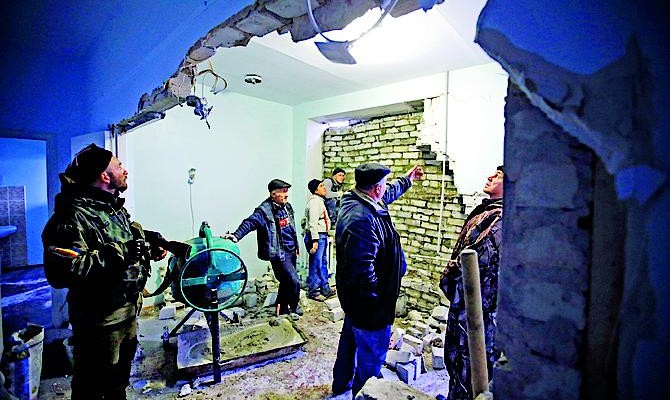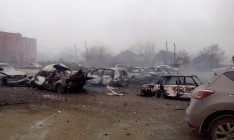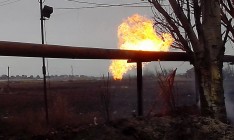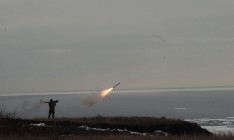Finance
rules of the gameUkrainian banks do not want to abandon the ATO zone

Financial institutions in Ukraine are in no rush to annul bank accounts and banking cards of clients living in the ATO zone. “The banks will react when the corresponding document is issued by the NBU. At the moment, we are studying the situation and waiting for the decision that will be made,” said head of the press service of PrivatBank Oleh Serha.
The state-run Oschadbank explained its position in a similar tone. “The situation is such that the procedure for closing accounts should be set by the NBU according to the decree of the president of Ukraine. At the moment, the central bank has not issued an order or any explanation,” head of the press service of Oschadbank Valentyn Voitkov specified.
A week ago President Petro Poroshenko assigned the National Bank of Ukraine to suspend servicing of bank accounts in the zone where the anti-terrorist operation are being conducted. Within one month the NBU is obligated to fulfill the task assigned by the head of state, who obligated banks to close accounts of private individuals and corporate clients. Over a week the NBU has not taken any actions.
For security reasons
By blocking access to bank accounts and banking cards, the NBU will deprive people of money to survive on. Over the past several months the volume of cash settlements in the occupied territories in the east of Ukraine sharply increased. Several banks confirmed this for Capital, though they did not specify exact volumes of the increase in payments. None of the banks have statistics of non-cash payments in the ATO zone, Director of the Ukrainian Interbank Association of Members of Payment Systems (EMA) Oleksandr Karpov noted. “We recommended clients that ended up in the ATO zone to convert to non-cash payments,” Serha confirmed. On the whole, the increase in non-cash payments almost doubled. If to compare October 2014 with the same month last year, the volume of non-cash payment through POS terminals of PrivatBank grew from UAH 2.9 bn to UAH 4.2 bn for payment for goods alone.
Taking cash out from ATMs through the use of payment cards in certain regions of the Donbas was prohibited long ago. Banks stopped replenishing ATMs with cash due to hold-ups and hijacking of armored trucks. “Due to the fact that many banks and ATM machines are not working in the ATO zone, clients that have been deprived of the ability to take out cash are actively paying for goods in shopping malls with their banking cards,” said Assistant Manager of the Retail Business Development Administration of OTP Bank Svitlana Syrozhenko. The situation with ATMs in the territories controlled by insurgents is quite clear – the traffic has practically dropped to zero. “There are no more clients of ATMs of the Ukrainian Processing Center on the occupied territories in the Luhansk oblast and in the Donetsk oblast their number is quickly waning,” Chairman of the Board of the UPC Anton Romanchuk specified.
The reduction in the number of ATMs and payment terminals in the Donbas is confirmed by data of the NBU. Since the start of the year to early October the number of ATMs in the Donetsk oblast was reduced from 4,039 units to 3,278 units and payment terminals – from 16,872 to 12,820. In the Luhansk oblast the situation is no better: in the entire region less than 1,500 ATMs and 5,500 payment terminals remain in operation. Taking into account the fact that the NBU provided data that was a month and a half old, the number of ATMs and terminals are even less today.
Unfavorable risk
It can be predicted with a high degree of probability that according to November calculations non-cash payments on the occupied territories will increase. Moreover, the local residents will try to reduce the amount of cash on their cards to zero understanding full well that the NBU plans to annul them. Certain Russian politicians are speculating on this decision of the Ukrainian government. Recently, deputy of the State Duma of Russia Yevgeny Fedorov told the mass media that a law has already been drafted that will allow Russian banks to “open branches on territories where its citizens that suffered from humanitarian disasters live”. By the way, even if Russian legislators adopt such a law the probability that Russian banks will open in the Donbas region is slim to none. This means that in the event of the departure of Ukrainian banks the territory not controlled by Ukraine’s government will be left without banking services outright.






 of the agreement of syndication with Financial Times Limited are strictly prohibited. Use of materials which refers to France-Presse, Reuters, Interfax-Ukraine, Ukrainian News, UNIAN agencies is strictly prohibited. Materials marked
of the agreement of syndication with Financial Times Limited are strictly prohibited. Use of materials which refers to France-Presse, Reuters, Interfax-Ukraine, Ukrainian News, UNIAN agencies is strictly prohibited. Materials marked  are published as advertisements.
are published as advertisements.